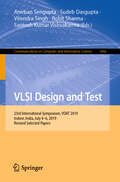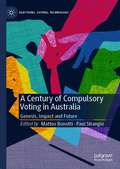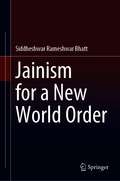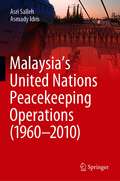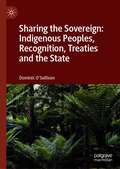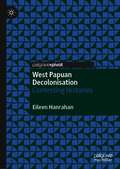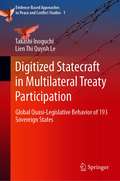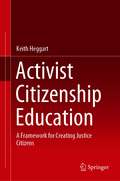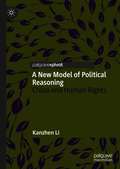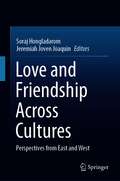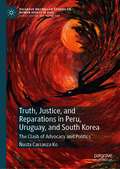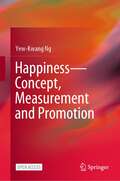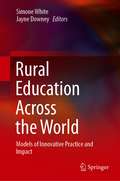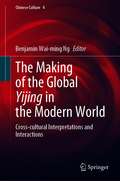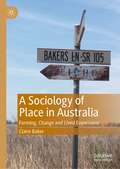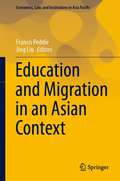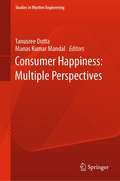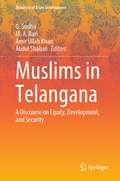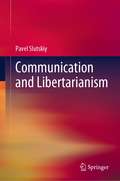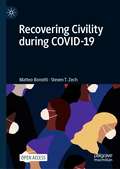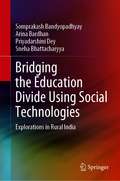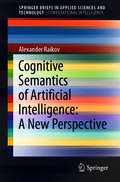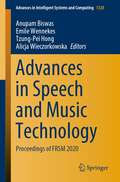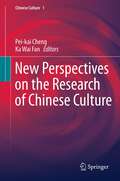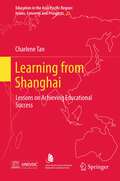- Table View
- List View
VLSI Design and Test: 23rd International Symposium, VDAT 2019, Indore, India, July 4–6, 2019, Revised Selected Papers (Communications in Computer and Information Science #1066)
by Rohit Sharma Virendra Singh Sudeb Dasgupta Anirban Sengupta Santosh Kumar VishvakarmaThis book constitutes the refereed proceedings of the 23st International Symposium on VLSI Design and Test, VDAT 2019, held in Indore, India, in July 2019. The 63 full papers were carefully reviewed and selected from 199 submissions. The papers are organized in topical sections named: analog and mixed signal design; computing architecture and security; hardware design and optimization; low power VLSI and memory design; device modelling; and hardware implementation.
A Century of Compulsory Voting in Australia: Genesis, Impact and Future (Elections, Voting, Technology)
by Matteo Bonotti Paul StrangioCompulsory voting has operated in Australia for a century, and remains the best known and arguably the most successful example of the practice globally. By probing that experience from several disciplinary perspectives, this book offers a fresh, up-to-date insight into the development and distinctive functioning of compulsory voting in Australia. By juxtaposing the Australian experience with that of other representative democracies in Europe and North America, the volume also offers a much needed comparative dimension to compulsory voting in Australia. A unifying theme running through this study is the relationship between compulsory voting and democratic well-being. Can we learn anything from Australia’s experience of the practice that is instructive for the development of institutional bulwarks in an era when democratic politics is under pressure globally? Or is Australia’s case sui generis – best understood in the final analysis as an intriguing outlier?
Jainism for a New World Order
by Siddheshwar Rameshwar BhattThis book analyses global issues holistically and offers pragmatic solutions from a Jainism perspective. Accordingly, it presents a fresh vision of individual development, social transformation and cosmic wellbeing based on the central tenets and practices of Jainism. Through this book, readers learn viable solutions to the current problems of environmental disharmony, economical distress, and religious and cultural conflicts. It deals with religious pluralism and brings to fore the need for harmony of religions and interfaith dialogues. The book is interesting for people from varied walks of life who are looking forward to a world that is established in peace, harmony and wellness. It is of immense value and interest for people from all walks of life to the Jain community to revisit the basic tenets propounded in classical literature.
Malaysia’s United Nations Peacekeeping Operations (1960–2010)
by Asri Salleh Asmady IdrisSmall and developing states make up the majority of participants in United Nations Peacekeeping Operations (UNPKO), and Malaysia is one of these. The numerous previous studies on Malaysia’s UNPKO are primarily historical narratives which focus on practical, policy-related issues and due process, making no attempt to synchronize the nexus between theory and policy analysis. Nor do they cover the theoretical aspect which can operationalize and address the question of the roles played by Malaysia’s domestic actors (foreign policy executives, legislature, military, media, public opinion) in the respective decision-making processes as well as those of external level, such as international power politics and geopolitical considerations. In other words, they are predominantly a historical narrative of only several Malaysia’s UNPKO.This book fills the critical gap. It deliberates on the respective national and international decision-making processes, especially from the Malaysian point of view, and analyses the theoretical and practical impacts of Malaysia’s UNPKO in understanding international politics. Apart from providing a well-researched account of Malaysia’s UNPKO across the globe for 50 years, i.e. 1960-2010, this book examines the determinants by using qualitative data, particularly key-informant interviews and documentary analysis. Thus, while most studies of Malaysia’s UNPKO single out domestic imperatives as the most vital determinant, this book, on the contrary, comprehensively identifies the prevailing world security order as the most important determinant influencing Malaysia’s UNPKO, followed by the domestic ones.
Sharing the Sovereign: Indigenous Peoples, Recognition, Treaties and the State
by Dominic O'SullivanThis book explains how recognition theory contributes to non-colonial and enduring political relationships between Indigenous nations and the state. It refers to Indigenous Australian arguments for a Voice to Parliament and treaties to show what recognition may mean for practical politics and policy-making. It considers critiques of recognition theory by Canadian First Nations’ scholars who make strong arguments for its assimilationist effect, but shows that ultimately, recognition is a theory and practice of transformative potential, requiring fundamentally different ways of thinking about citizenship and sovereignty. This book draws extensively on New Zealand’s Treaty of Waitangi and measures to support Maori political participation, to show what treaties and a Voice to Parliament could mean in practical terms. It responds to liberal democratic objections to show how institutionalised means of indigenous participation may, in fact, make democracy work better.
West Papuan Decolonisation: Contesting Histories
by Eileen HanrahanIn alignment with Indigenous Politics, an emerging sub-field of Politics and IR, this book considers West Papuan Indigenous nationhood. Combining Settler Colonial Studies and Critical Indigenous Theory, the research opens up sovereignty as a political category of analysis to reveal an embedded nation within Indonesia.In June 2000 the Second Papuan People’s Congress in Jayapura rejected the basis on which West Papua had been incorporated into Indonesia and resolved that the “people of Papua have been sovereign as a nation and a state since 1 December 1962”. Indonesian president Wahid firmly opposed this resolution and state officials posted historical narratives on the Australian Embassy website that legitimated Indonesia’s incorporation of the once non-self-governing territory.A mapping and analysis of these narratives demonstrate a settler colonial present within Southeast Asia. It is argued that the US’s appeasement of Indonesia’s takeover in the 1960s was based on the Great Power’s concern to promote its strategic and economic status in the region.“This is a timely intervention that contributes to a growing debate on settler colonialism as a mode of domination that characterises the global present and involves locales not normally seen as settler colonial. West Papua fits the bill”. -Associate Professor Lorenzo Veracini, author of Settler Colonial Studies: A Theoretical overview.
Digitized Statecraft in Multilateral Treaty Participation: Global Quasi-Legislative Behavior of 193 Sovereign States (Evidence-Based Approaches to Peace and Conflict Studies #1)
by Takashi Inoguchi Lien Thi LeThis book is a rarity in that it opens a genuinely creative new vista for understanding global politics as distinguished from international politics, enhancing the vision for understanding global subjects such as multilateral treaties and the Covid-19 virus. Six hundred multilateral treaties deposited in the UN are conceptualized as a bundle of quasi-social contracts by sovereign states. A state’s participation in multilateral treaties is envisaged as digitized statecraft. Using a state’s physical actions and treaties’ attributes, 193 profiles of statecraft are analyzed with the implications for the future of global politics. This book demonstrates that multilateral treaties are both a vehicle and an agency in the globalization trend; thus, both state and international actors influence a state’s joining multilateral treaties. The book represents a marriage of international law and applied information science. It provides a framework for empirical modeling based on artificial intelligence and analyzes this framework in terms of international law and international relations. This book thus creates a new understanding of global politics.
Activist Citizenship Education: A Framework for Creating Justice Citizens
by Keith HeggartThis book explores alternative models of civics and citizenship education. Specifically, it uses Justice Citizens, a participatory research and film-making project, as a tool to examine young people’s ideas about active citizenship and participation in public spaces. It introduces a framework that seeks to explore the diverse and apparently contradictory nature of young people’s active citizenship. The framework draws on complexity theory combined with critical pedagogy and democratic education to formulate an approach to developing active citizenship among young people. This approach extends theories of both critical pedagogy and education for citizenship, and by doing so seeks to explain the variegated nature of young people’s engagement with civil society. This book contains a valuable repository of ideas and resources for application for teachers to use in schools and classrooms. Academics engaged in initial teacher education, at both primary and secondary levels, will find the framework of use when describing the importance and new approaches to civics and citizenship education within the current school and policy environments.
A New Model of Political Reasoning: China and Human Rights
by Kanzhen LiWhy politics and international relations “seem” to be driven by power/strategies in some conditions but “seem” to be attached to values/beliefs in other situations? Based on findings in (political) psychology and international relations, the book builds a new political reasoning model: a two-layered motivation-heuristic complex. The model grasps the internal mechanism that drives the co-existent and dynamic relationship between material and ideational considerations in making political choices/phenomena diverse and evolving across situations and periods. Applied to the case of China and human rights, the model helps understand several questions that attract those who are interested in the topic: e.g., the roots and contents of strategic and conceptual factors that continuously influence China’s human rights idea/policies; if, why and how the strategy-ideational relationships in such idea/policies evolve across periods; and the role that China's national security condition and external pressure play during such evolving relationships.
Love and Friendship Across Cultures: Perspectives from East and West
by Soraj Hongladarom Jeremiah Joven JoaquinThis collection brings together different philosophical points of view discussing two important aspects of human life, namely love and friendship, within the broad context of comparative philosophy. These points of view differ in terms of their cultural orientations - East or West, ancient or modern; philosophical methodologies - analytical, historical, experimental, or phenomenological, broadly construed; and motivation - explanatory, revisionary, or argumentative. The volume is a comparative treatment of how diverse philosophical cultures view love and friendship, such as how Aristotle and Confucius’ views on friendship are similar and different, how the ancient Greeks and the Buddhists view friendship and happiness, and how posthumous love is possible. With contributions from a diverse set of scholars, this book presents the emerging views of Southeast Asian philosophers compared with those of philosophers from other regions, including Europe and North America. The volume thus provides a multi-faceted way of understanding love and friendship across cultures, and will be relevant to scholars interested in philosophy, the history of ideas, Asian Studies, and religious studies.
Truth, Justice, and Reparations in Peru, Uruguay, and South Korea: The Clash of Advocacy and Politics (Palgrave Macmillan Studies on Human Rights in Asia)
by Ñusta Carranza KoThis book presents the first cross-regional analysis of post-transitional justice periods and the conditions that influence states’ behaviors. Specifically, the book examines why states that adopt and ostensibly implement transitional justice norms as policies—criminal prosecutions, reparations policies, and truth commissions—fail to follow through with their recommendations. Applying these perspectives to a comparative study of states from Latin America and East Asia—namely, Peru, Uruguay, and South Korea—which accepted and implemented transitional justice norms but took different trajectories of behavior after the implementation of policies, this book contributes to understanding the relationship of norm influence on states and why states change in compliance after norm adoption. The book explores the conditions that contribute or limit the continued respect for transitional justice norms, emphasizing the political interests and transnational advocacy networks’ roles in affecting states’ policies of addressing past abuses.
Happiness—Concept, Measurement and Promotion
by Yew-Kwang NgThis open access book defines happiness intuitively and explores several common conceptual mistakes with regard to happiness. It then moves on to address topical issues including, but not limited to, whether money can buy you happiness, why happiness is ultimately the only thing of intrinsic value, and the various factors important for happiness. It also presents a more reliable and interpersonally comparable method for measuring happiness and discusses twelve factors, from A to L, that are crucial for individual happiness: attitude, balance, confidence, dignity, engagement, family/friends, gratitude, health, ideals, joyfulness, kindness and love. Further, it examines important public policy considerations, taking into account recent advances in economics, the environmental sciences, and happiness studies. Novel issues discussed include: an environmentally responsible happy nation index to supplement GDP, the East Asian happiness gap, a case for stimulating pleasure centres of the brain, and an argument for higher public spending.
Rural Education Across the World: Models of Innovative Practice and Impact
by Simone White Jayne DowneyThis book brings together authors from United States, South Africa, United Kingdom, China, Canada and Australia to provide insights and case studies from across a range of contexts to explore the interplay between the notions of rurality, innovation and education. The book reveals a hopeful and resilient approach to innovative rural education and scholarship collectively and provides important evidence to speak against an often deficit view of rural education. Three patterns are revealed, namely: the importance of place-attentive strategies, the importance of joined up alliances to maximise resources and networks and finally, the need to utilize alternative methodologies and frameworks that have a starting point of difference rather than deficit for any rural initiative or approach. By drawing from international examples and responding in innovative ways to rural education challenges, this book provides an opportunity to share international insights into innovations, interventions and partnerships that promote and support rural education in its broadest sense.
The Making of the Global Yijing in the Modern World: Cross-cultural Interpretations and Interactions (Chinese Culture #4)
by Benjamin Wai-ming NgThis book represents an ambitious effort to bring leading Yijing scholars together to examine the globalisation and localisation of the 'Book of Changes' from cross-cultural and comparative perspectives. It focuses on how the Yijing has been used to support ideologies, converted into knowledge, and assimilated into global cultures in the modern period, transported from the Sinosphere to British, American and French cultural traditions, travelling from East Asia to Europe and the United States. The book provides conceptualised narratives and cross-cultural analyses of the global popularisation and local assimilation of the Yijing, highlighting the transformation and application of the Yijing in different cultural traditions, and demonstrating how it acquired different meanings and took on different roles in the context of a global setting. In presenting a novel contribution to understandings of the multifaceted nature of the Yijing, this book is essential reading for scholars and students interested in the 'Classic of Changes'. It is also a useful reference for those studying Chinese culture, Asian philosophy, East Asian studies, and translation studies.
A Sociology of Place in Australia: Farming, Change and Lived Experience
by Claire BakerThis book weaves a social, economic and cultural history of Australia with rare first-hand accounts of the lived experience of change related to farming and agriculture. It provides a rich sociology of how living on the land has changed throughout Australia’s history. The book investigates the complex effects of the state on everyday life, using an historical agricultural case study of place to explore long-running sociohistorical processes of change examined through both a macro and micro sociological lens. This provides a multi-faceted perspective from which to examine economic, social and cultural transformations in each of these contexts and change is examined through multiple sites of expression: public policy and the role of the state; colonial processes of dispossession; social and cultural systems of value; economic change and its consequences; farming practices and lived experience; neoliberalism and globalisation and their social impacts; community decline and trends toward corporate and foreign land ownership. Each of these transformations impact upon lived experience and everyday life and this book provides grounded insight into exactly this relationship and process.
Education and Migration in an Asian Context (Economics, Law, and Institutions in Asia Pacific)
by Francis Peddie Jing LiuThis edited book explores the complex and multifaceted connections between education and migration in an Asian context from multiple perspectives. It features studies from China, Japan, India, the Philippines, Thailand, and Timor-Leste and covers diverse migration and education experiences. These experiences encompass internal and international migration and forced displacement, as well as questions surrounding education such as school choice, education provision and training as human capital; education and social inclusion; and student performance in a post-conflict context. By covering a wide range of questions and situations, the original scholarship in this book reveals how human development concerns and higher rates of movement within and outside of Asian countries operate on multiple levels in a globalized world.
Consumer Happiness: Multiple Perspectives (Studies in Rhythm Engineering)
by Tanusree Dutta Manas Kumar MandalThis book helps quench the quest of knowledge of academicians, researchers, and others interested in developing a complete and critical understanding of consumer happiness. The relentless search of happiness by humans is sought in different ways. Scientific discussion on happiness for long was considered a forte of Philosophers. Other disciplines seldom delved into this. But today not only science but neuroscience, marketing, and other varied fields have started delving into it and have developed a keen interest. The book has been conceptualized on this line of thinking and thus divided into two parts. The first part is customized towards understanding various perspectives of happiness and the relative importance of knowing the same. The first chapter of this section is on the biological perspective of happiness. The second is titled ‘Behavioural perspective’. The third chapter is an attempt to elucidate the cultural perspective of the concept of happiness. The fourth is on the role of technology in inducing happiness. Fifth and sixth are on theories of happiness and measuring happiness, respectively. Knowledge about the different perspective and theories has a wide range of benefits. It informs us about how the brain works, interprets, and reacts. This theoretical understanding helps us to move beyond the trial and error methods towards a more scientific underpinning of adoption of measures that would generate long-lasting happiness in consumers.The second part of the book is dedicated toward understanding consumer happiness from a neuroscience perspective, i.e. keeping consumer happy. This segment has ten chapters. The first is on differentiating the concept of happiness from satisfaction. The second is on sensory marketing and happiness. The third deals with the store design and shelving of products to generate happiness. Fourth and fifth chapters relate to persuading the consumers. While the fourth chapter is on developing persuasive messages and the fifth is on subliminal messaging sixth chapter is on pricing and seventh on advertising. The eighth chapter highlights the role of emotions and the ninth is on the different factors that induce happiness in consumers. The last chapter is about raising some unanswered questions and food for thought for readers. Together the contents of the book make for a complete understanding of the concept of happiness and how it is shaping the world of marketing. Addressing the ‘what’ and ‘how’ of consumer happiness in the same book makes the book comprehensive.
Muslims in Telangana: A Discourse on Equity, Development, and Security (Dynamics of Asian Development)
by G. Sudhir M. A. Bari Amir Ullah Khan Abdul ShabanThis book analyses the state of development of Muslims at the regional level. It explains the linkages between the findings of global, national, and state-level studies with regard to the current status of Muslims and broadens understanding of Muslims and their participation in virtually all major sectors, including the economy, housing, demography, health, migration, state policy, and affirmative action. The book presents the challenges faced by the community and reflects upon the socio-economic and educational conditions of Muslims in Telangana State. It presents a comparative analysis of mortality data, maternal health, delivery care, and child immunization, as well as reproductive health aspects and children’s nutritional status. It shares valuable insights into the impacts of emigration and internal migration on health among local Muslims and presents a detailed analysis of data from the Census of India, NSSO, and Commission of Inquiry on Socio-Economic and Educational Status of Muslims regarding the social, economic, and demographic situation of Muslims in Telangana, as well as their opportunities for development under the newly formed state government. The book would be of great interest to scholars and researchers in development economics, sociology, politics, history, cultural studies, minority studies, Islamic studies, and policy studies, as well as policymakers, civil society activists, and those working in media and journalism.
Communication and Libertarianism
by Pavel Slutskiy"This is an outstanding contribution to both libertarian political philosophy and communication theory. It is far and away the most comprehensive work on communication issues in libertarian theory ever published. The author has integrated successfully the libertarian insights of Mises, Rothbard, Block, Kinsella and others with the philosophy of language as developed by Austin, Searle and Grice. He has done so in a unique and unprecedented way. The book would appeal to students and scholars interested in libertarian theory and more generally, to philosophers and political scientists interested in high-level scholarship.” - David Gordon, libertarian philosopher and intellectual historian, Ludwig von Mises Institute.
Recovering Civility during COVID-19
by Matteo Bonotti Steven T. ZechThis Open Access book examines many of the challenges posed by the COVID-19 pandemic through the distinctive lens of civility. The idea of civility appears often in both public and academic debates, and a polarized political climate frequently leads to allegations of uncivil speech and behaviour. Norms of civility are always contested, even more so in moments of crisis such as a global pandemic. A focus on civility provides crucial insight and guidance on how to navigate the social and political challenges resulting from COVID-19. Furthermore, it offers a framework through which citizens and policymakers can better understand the causes and consequences of incivility, and devise ways to recover civility in our social and political lives.
Bridging the Education Divide Using Social Technologies: Explorations in Rural India
by Somprakash Bandyopadhyay Arina Bardhan Priyadarshini Dey Sneha BhattacharyyaThis book explains the concept of education divide in rural India and identifies various factors that shape and sustain such a divide. In doing so, it also discusses a range of attempts undertaken to bridge the education divide. Subsequently, the book has attempted in providing a socio-technical framework towards optimally deploying social technologies for addressing the issue of education divide of marginalized communities. The proposed framework offers a transition from traditional content-centric, teacher-centric and centralized education ecosystem to a connection-centric, learner-centric and decentralized education ecosystem of the socio-digital age. It demonstrates how Internet-enabled digital platforms, based on the principles of sharism and mass collaboration using social technologies, could help to solve one of the greatest problems facing the world: mitigating the extant education divide by delivering quality education to underprivileged sections of society. The book also presents empirical validation of the proposed framework to show how a community-driven blended learning platform can mobilize the dormant knowledge capital of domain experts to teach underprivileged rural Indian children, as well as help form communities of practice to enable lifelong learning for the rural adult population. The book closes by pointing out the challenges involved in building an equitable education ecosystem using social technologies and ultimately the possibility of creating a fair and equitable society. Given its scope, the book offers a valuable resource for researchers, policymakers and practitioners in the domain of education who want to transform education ecosystems by using technological and process-related innovations to improve educational practices for underprivileged sections of society.
Cognitive Semantics of Artificial Intelligence: A New Perspective (SpringerBriefs in Applied Sciences and Technology)
by Alexander RaikovThis book addresses the issue of cognitive semantics’ aspects that cannot be represented by traditional digital and logical means. The problem of creating cognitive semantics can be resolved in an indirect way. The electromagnetic waves, quantum fields, beam of light, chaos control, relativistic theory, cosmic string recognition, category theory, group theory, and so on can be used for this aim. Since the term artificial intelligence (AI) appeared, various versions of logic have been created; many heuristics for neural networks deep learning have been made; new nature-like algorithms have been suggested. At the same time, the initial digital, logical, and neural network principles of representation of knowledge in AI systems have not changed a lot. The researches of these aspects of cognitive semantics of AI are based on the author's convergent methodology, which provides the necessary conditions for purposeful and sustainable convergence of decision-making.
Advances in Speech and Music Technology: Proceedings of FRSM 2020 (Advances in Intelligent Systems and Computing #1320)
by Anupam Biswas Emile Wennekes Tzung-Pei Hong Alicja WieczorkowskaThis book features original papers from 25th International Symposium on Frontiers of Research in Speech and Music (FRSM 2020), jointly organized by National Institute of Technology, Silchar, India, during 8–9 October 2020. The book is organized in five sections, considering both technological advancement and interdisciplinary nature of speech and music processing. The first section contains chapters covering the foundations of both vocal and instrumental music processing. The second section includes chapters related to computational techniques involved in the speech and music domain. A lot of research is being performed within the music information retrieval domain which is potentially interesting for most users of computers and the Internet. Therefore, the third section is dedicated to the chapters related to music information retrieval. The fourth section contains chapters on the brain signal analysis and human cognition or perception of speech and music. The final section consists of chapters on spoken language processing and applications of speech processing.
New Perspectives on the Research of Chinese Culture
by Pei-Kai Cheng Ka Wai FanThis volume contains high quality articles, originally published in Chinese in the Chinese Journal Jiuzhou Xuelin [Chinese Cultural Quarterly] and new articles written on special invitation by established scholars in the field. The theme of the volume is 'New Perspectives on Research of Chinese Culture', introducing the latest trends and new developments in the research into Chinese history, humanities, music and geography. The articles are written by well-known scholars in the field who examine Chinese culture from various new perspectives adopting different research methods.
Learning from Shanghai: Lessons on Achieving Educational Success (Education in the Asia-Pacific Region: Issues, Concerns and Prospects #21)
by Charlene TanThe Shanghai school system has attracted worldwide attention since its impressive performance in the International Programme for Student Assessment (PISA) in 2009. The system ranks as a 'stunning success' according to standards of the Organisation for Economic Co-operation and Development (OECD). Shanghai also stands out for having the world's highest percentage of 'resilient students' - students from socio-economically disadvantaged backgrounds who emerge as top performers. Learning From Shanghai: Lessons on Educational Success offers a close-up view of the people and the policies that have achieved such world-class performance. Based on research and personal observation gathered during the author's recent field work with school principals, teachers and students, this book explores the factors that explain Shanghai's exceptional success in education. The approach combines high standards of scholarly research and analysis with the author's unique personal insights, as evidenced by chapters entitled Education is Filling a Bucket and Lighting a Fire and Tiger Mothers, Dragon Children. Drawing on her experience as an education professional and a teacher of teachers, Charlene Tan thoroughly examines and analyzes the people, the policies and the practices that distinguish Shanghai educators. The contents include comprehensive details on the Shanghai approach to quality education, from discussion of the balance between centralization and decentralization, to school autonomy and accountability, to testing policy and professional development for teachers. The book includes detailed tables on curriculum and school performance targets, sample appraisal forms for teachers and students, and dozens of photographs. The author is an Associate Professor at the National Institute of Education, Nanyang Technological University, Singapore.
